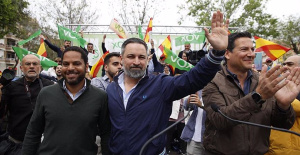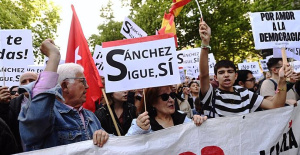He explains that it is not yet the right procedural moment to determine if the crimes investigated have prescribed.
MADRID, 10 Nov. (EUROPA PRESS) -
The National Court judge Manuel García Castellón has reopened the investigation into the kidnapping and murder of Miguel Ángel Blanco for the former head of ETA Ignacio Miguel Gracia, alias 'Iñaki de Rentería', thus correcting his initial decision, with which he appreciated office that the alleged crimes had prescribed for the former ETA member, although he has refused to rule on whether the whole case has expired, explaining that it is not the time to clarify it.
In an order this Thursday, to which Europa Press has had access, the head of the Central Court of Instruction Number 6 responds to the appeals filed against the file for 'Iñaki de Rentería', estimating those of the Prosecutor's Office and the Popular Party ( PP) and only partially that of Dignity and Justice (DyJ), precisely, so as not to enter now into the debate on prescription.
"The criterion set forth in the order of July 8, 2022 is maintained, regarding the prescription of the crime, its interruption and its computation, for which the appeal for reform filed by the Public Prosecutor's Office is fully upheld. Likewise, given that the estimate coincides with the one requested by the PP, his appeal is estimated", he indicates.
However, it adds that, "in the case of the Dignity and Justice Association (DyJ), the appraisal of the appeal is only partial, since there is no reason to declare at this procedural moment the imprescriptibility of the facts under investigation, as it is intended in its governing document, so it is not appropriate to access said petition".
Thus, he agrees to amend his initial decision, now declaring that "there is no place to declare the prescription of the crimes imputed to Ignacio Miguel Gracia for the facts that gave rise to the formation of this summary."
It was on July 8 when García Castellón ex officio appreciated that the facts had prescribed with respect to 'Iñaki de Rentería' at the same time that he cited José Javier Arizcuren, 'Kantauri', as accused; Miguel Albisu,'Mikel Antza'; and María Soledad Iparraguirre, 'Anboto', who have already appeared as investigated in the National High Court, although they all accepted their right not to testify.
In this way, the magistrate has accepted the thesis proposed by the prosecutor Vicente González Mota, who in his appeal stated that the file for De Rentería should be revoked, arguing that "agreeing on the resolution of dismissal, with the consequences that it entails, comparable to that of acquittal, it is not appropriate at this time".
For its part, the PP put on the table the recommendations made in March by the European Parliament, which advocate considering ETA's crimes as against humanity and, therefore, imprescriptible, including those prior to 2004.
And Dignity and Justice deployed its 'Miguel Ángel Blanco doctrine', according to which criminal responsibility for this crime has not been extinguished since the imprescriptibility of crimes against humanity established by the Council of Europe is applicable to crimes committed by ETA and by other terrorist groups as of December 24, 1990, a total of 430 murders, including that of the 'popular' leader.
The issue of prescription is one of the legal debates raised as a result of the reopening of criminal investigations for this crime. The traditional position of the Public Prosecutor's Office of the National High Court considers that the limitation period has been interrupted with the accusation, which would mean that the crimes for all the former ETA leaders mentioned except 'Kantauri' have expired.
As Europa Press learned, González Mota proposed at the time an intermediate path, halfway between that of the Prosecutor's Office and that of DyJ, which meant understanding that the term was interrupted with the arrest, which would allow these investigations to be kept alive for the rest of the former accused ETA chiefs, but the difference of opinion between this prosecutor and his other colleagues led him to ask to be relieved of this case.
The State Attorney General, Álvaro García Ortiz, announced during his appearance in the Congress of Deputies that he would take the debate to the Chamber Prosecutors Board so that they could determine their position. However, the first held since then, last October, could not be addressed because all the necessary documentation to rule on the matter is not yet available, part of which must be sent by France, according to tax sources consulted by this news agency.
García Castellón reopened the case in March after admitting a complaint from the victims' association that also seeks to convict those who formed the executive committee of ETA or zuba when the crime was committed.
At the request of the instructor, the Civil Guard has already issued a report in which it blames the former ETA chiefs for the death of the young PP councilor in Ermua because it considers that an order from him could have prevented it.
It should be remembered that, in the case of Blanco's murder, the First Criminal Section of the National Court already sentenced in 2006 to 50 years in prison the former ETA leader Francisco Javier García Gaztelu, 'Txapote', and his sentimental partner and member of ETA Irantzu Gallastegui Sodupe, 'Amaia', as perpetrators.
In its sentence, the court assured that both "planned and executed the kidnapping and subsequent murder of Miguel Ángel Blanco, following the guidelines of the leadership of the terrorist organization ETA, whose most immediate objectives were the kidnapping of a PP councilor to demand in exchange for their release the approach of the prisoners of the gang to prisons in the Basque Country".

 Exploring Cardano: Inner Workings and Advantages of this Cryptocurrency
Exploring Cardano: Inner Workings and Advantages of this Cryptocurrency Seville.- Economy.- Innova.- STSA inaugurates its new painting and sealing hangar in San Pablo, for 18 million
Seville.- Economy.- Innova.- STSA inaugurates its new painting and sealing hangar in San Pablo, for 18 million Innova.- More than 300 volunteers join the Andalucía Compromiso Digital network in one month to facilitate access to ICT
Innova.- More than 300 volunteers join the Andalucía Compromiso Digital network in one month to facilitate access to ICT Innova.-AMP.- Ayesa acquires 51% of Sadiel, which will create new technological engineering products and expand markets
Innova.-AMP.- Ayesa acquires 51% of Sadiel, which will create new technological engineering products and expand markets Unicaja lifts its first FIBA Champions League at the expense of Lenovo Tenerife
Unicaja lifts its first FIBA Champions League at the expense of Lenovo Tenerife Abascal (Vox) criticizes that Sánchez is "victimizing" himself and calls for elections after his possible resignation
Abascal (Vox) criticizes that Sánchez is "victimizing" himself and calls for elections after his possible resignation Carlos Alcaraz reaches the round of 16 in Madrid without breaking a sweat
Carlos Alcaraz reaches the round of 16 in Madrid without breaking a sweat Some 5,000 people demonstrate in front of Congress for democracy, hours before Sánchez's decision
Some 5,000 people demonstrate in front of Congress for democracy, hours before Sánchez's decision How Blockchain in being used to shape the future
How Blockchain in being used to shape the future Not just BTC and ETH: Here Are Some More Interesting Coins Worth Focusing on
Not just BTC and ETH: Here Are Some More Interesting Coins Worth Focusing on UPV students build a prototype of a wooden house to move to Equatorial Guinea
UPV students build a prototype of a wooden house to move to Equatorial Guinea The UA opens the call for the Impulso 2024 Awards for the best innovative business initiatives
The UA opens the call for the Impulso 2024 Awards for the best innovative business initiatives ALI, virtual assistant from Alicante, internationally recognized by the OECD
ALI, virtual assistant from Alicante, internationally recognized by the OECD Retrópolis brings the golden age of video games and computing to the UPV
Retrópolis brings the golden age of video games and computing to the UPV A million people demonstrate in France against Macron's pension reform
A million people demonstrate in France against Macron's pension reform Russia launches several missiles against "critical infrastructure" in the city of Zaporizhia
Russia launches several missiles against "critical infrastructure" in the city of Zaporizhia A "procession" remembers the dead of the Calabria shipwreck as bodies continue to wash up on the shore
A "procession" remembers the dead of the Calabria shipwreck as bodies continue to wash up on the shore Prison sentences handed down for three prominent Hong Kong pro-democracy activists
Prison sentences handed down for three prominent Hong Kong pro-democracy activists ETH continues to leave trading platforms, Ethereum balance on exchanges lowest in 3 years
ETH continues to leave trading platforms, Ethereum balance on exchanges lowest in 3 years Investors invest $450 million in Consensys, Ethereum incubator now valued at $7 billion
Investors invest $450 million in Consensys, Ethereum incubator now valued at $7 billion Alchemy Integrates Ethereum L2 Product Starknet to Enhance Web3 Scalability at a Price 100x Lower Than L1 Fees
Alchemy Integrates Ethereum L2 Product Starknet to Enhance Web3 Scalability at a Price 100x Lower Than L1 Fees Mining Report: Bitcoin's Electricity Consumption Declines by 25% in Q1 2022
Mining Report: Bitcoin's Electricity Consumption Declines by 25% in Q1 2022 Oil-to-Bitcoin Mining Firm Crusoe Energy Systems Raised $505 Million
Oil-to-Bitcoin Mining Firm Crusoe Energy Systems Raised $505 Million Microbt reveals the latest Bitcoin mining rigs -- Machines produce up to 126 TH/s with custom 5nm chip design
Microbt reveals the latest Bitcoin mining rigs -- Machines produce up to 126 TH/s with custom 5nm chip design Bitcoin's Mining Difficulty Hits a Lifetime High, With More Than 90% of BTC Supply Issued
Bitcoin's Mining Difficulty Hits a Lifetime High, With More Than 90% of BTC Supply Issued The Biggest Movers are Near, EOS, and RUNE during Friday's Selloff
The Biggest Movers are Near, EOS, and RUNE during Friday's Selloff Global Markets Spooked by a Hawkish Fed and Covid, Stocks and Crypto Gain After Musk Buys Twitter
Global Markets Spooked by a Hawkish Fed and Covid, Stocks and Crypto Gain After Musk Buys Twitter Bitso to offset carbon emissions from the Trading Platform's ERC20, ETH, and BTC Transactions
Bitso to offset carbon emissions from the Trading Platform's ERC20, ETH, and BTC Transactions Draftkings Announces 2022 College Hoops NFT Selection for March Madness
Draftkings Announces 2022 College Hoops NFT Selection for March Madness























